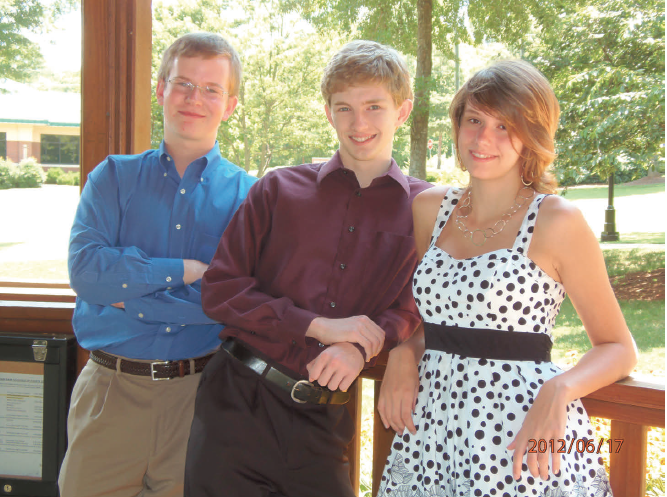 Max Nielson spoke May 3 at the Freedom From Religion in the Bible Belt conference sponsored by FFRF in conjunction with its chapter, the Triangle Freethought Society, in Raleigh, N.C. Max had previously received a student activist award at FFRF’s 2012 annual convention in Portland, Ore.
Max Nielson spoke May 3 at the Freedom From Religion in the Bible Belt conference sponsored by FFRF in conjunction with its chapter, the Triangle Freethought Society, in Raleigh, N.C. Max had previously received a student activist award at FFRF’s 2012 annual convention in Portland, Ore.
That year he became lead plaintiff in FFRF’s federal lawsuit to stop graduation prayers in his school district. The issue is largely resolved, but FFRF, Max and two other plaintiffs (Dakota McMillan and Jacob Zupon) are still challenging prayer by their school board.
Max received a second honor in Raleigh, the Allen P. Wilkinson Student Activist Award of $1,000, generously endowed by FFRF member Allen P. Wilkinson. He asked that it go to the student who “best exemplifies qualities of FFRF and dares to speak up and engage in enlightening high school students and others in the community.”
(Photo: Jacob Zupon and Dakota McMillan (with Max Nielson, center) received FFRF Thomas Jefferson Student Activist Awards of $2,000 this spring for serving, with Max, as the all-essential plaintiffs in an FFRF lawsuit. The ongoing federal lawsuit challenges graduation prayers and school board prayers in their South Carolina school district. The $1,000 awards were endowed by Len and Karen Eisenberg, FFRF members, with additional funding via the Cliff Richards Memorial Student Activist Award, recognizing Jacob and Dakota’s special contributions. The students enabled the lawsuit to go forward after Max graduated.)
‘One of the most profoundly impactful moments of my life.’
By Max Nielson
I was raised secular with the Unitarian Universalist Church in Columbia, S.C. So when I was confronted with the issue of school prayer at my high school, I didn’t really know what to do at first. I didn’t know that I could do anything until I found out that a similar issue had already been settled with help from FFRF in my state through the complaint of Harrison Hopkins.
District 5, where I lived, had a policy on the books that a majority of graduating seniors would vote on whether or not to have a prayer at graduation. It is kind of ridiculous. Rights are not to be voted on. And every part of that graduation prayer ceremony process was facilitated by school officials. It was a clear violation of church and state across the board.
Since I last spoke at the FFRF convention about my case, I’ve gone on to found the Secular Student Alliance at the College of Charleston and interned in D.C. with the Secular Coalition for America. I began work as their social media specialist, in which I have helped launch Openly Secular, which has been a lot of fun. This year I continued to lead the Secular Student Alliance in Charleston.
This summer I am interning with the Center for Inquiry in Buffalo, N.Y.
The opportunity FFRF has given me to become involved with this movement I never even knew existed has probably been one of the most profoundly impactful moments of my life. I am very grateful for the opportunity. But my co-plaintiff, Dakota, is still in high school. Dakota and my other co-plaintiff, Jacob, having just graduated, didn’t have all of those opportunities.
Something that stands out since I last spoke was that Dakota was handed a note by one of her friends, who said — I can quote directly from it — he was discussing the issue of the lawsuit with his mother. He was basically given the ultimatum of agreeing that there should be a graduation prayer or not living in the household. It was that stark.
The way Dakota got this note was that she was wondering why this friend suddenly had stopped talking to her. It is horrifying. It is a scary thing to have happen to her.
I went through my deposition with the attorneys. The first half of it was very intense. They were asking all sorts of questions about my history with the Boy Scouts of America or any time I would have encountered public prayer of any sort.
It relaxed after Aaron, my fantastic lawyer, cut in and informed them I am only suing for nominal damages. Even the lawyers on the other side understand that the school prayer issue is pretty much settled.
Since then, as mentioned, the case has grown to encompass the school board prayers, and at those events they oftentimes have pastors come in from neighboring churches. And there are events at the school board meetings where students are invited and actively attend. I think on that issue we will see some change.
As Annie Laurie mentioned, they have changed the school policy from voting on graduation prayer to directly parroting the South Carolina Student-led Messages Act. Which I am OK with. It basically says the school can appoint a student speaker, and then they are done. That is it. They do not have any influence on what that speaker says. If that speaker wants to pray, that is within the purview of their free speech. I am much more comfortable with that than a specifically sponsored graduation prayer event.
I am happy to see how far this has come, and I am very grateful for this award and the opportunities FFRF has given me. Thank you.

